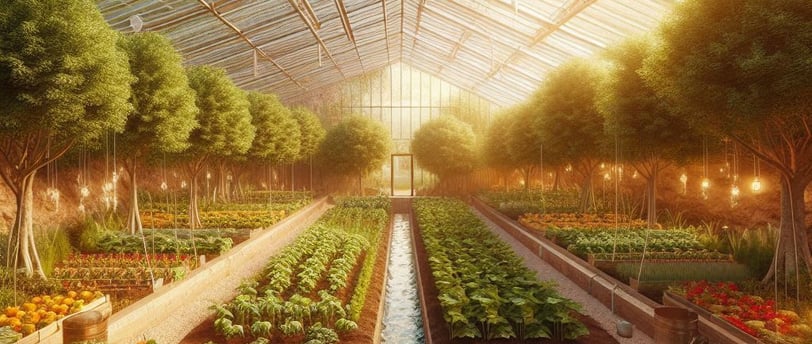The Role of Solar Technology in Permaculture: Harnessing the Power of the Sun for Sustainable Agriculture
5/2/20242 min read


The Role of Solar Technology in Permaculture
Permaculture is a sustainable agricultural design system that aims to create harmonious and self-sufficient ecosystems. It emphasizes the use of renewable resources and minimizing waste. Solar technology plays a crucial role in supporting permaculture practices by providing clean and abundant energy for various applications.
Shading Benefits for Plants from Solar Panels
Solar panels not only generate electricity but also provide shading for plants in permaculture systems. The shade provided by solar panels can benefit certain plants in several ways:
- Protection from Extreme Weather: Solar panels can shield plants from excessive heat, intense sunlight, and strong winds, creating a more favorable microclimate for their growth.
- Reduced Water Evaporation: The shade from solar panels helps to reduce water evaporation from the soil, allowing plants to retain moisture and reducing the need for irrigation.
- Prevention of Weed Growth: Solar panels can also act as a physical barrier, preventing weed growth around the shaded areas, reducing competition for nutrients and water.
- Extended Growing Season: By providing shade, solar panels can help extend the growing season for certain plants that are sensitive to high temperatures, allowing for year-round cultivation.
Solar Panels as Greenhouses
Thin-film solar panels and clear solar panels offer additional benefits in permaculture by serving as perfect greenhouses for year-round growing:
- Optimal Light Transmission: Clear solar panels allow maximum sunlight penetration, providing plants with the necessary light for photosynthesis. This allows for the cultivation of a wide range of crops, including those that require high light intensity.
- Temperature Regulation: Solar panels can help regulate the temperature inside the greenhouse by absorbing and trapping heat. This helps create a stable and controlled environment, especially during colder seasons.
- Energy Generation: Thin-film solar panels integrated into greenhouses can simultaneously generate electricity while providing a suitable environment for plant growth. This renewable energy can be used to power various operations within the permaculture system.
- Space Optimization: By utilizing solar panels as greenhouse roofing, permaculture systems can maximize land use efficiency. This is particularly beneficial in areas with limited space or urban environments.
In conclusion, solar technology offers numerous advantages for permaculture practices. From providing shade and protection to plants, to serving as efficient greenhouses, solar panels contribute to the sustainability and productivity of permaculture systems. By harnessing the power of the sun, permaculturists can create self-sufficient ecosystems that are both environmentally friendly and economically viable.
